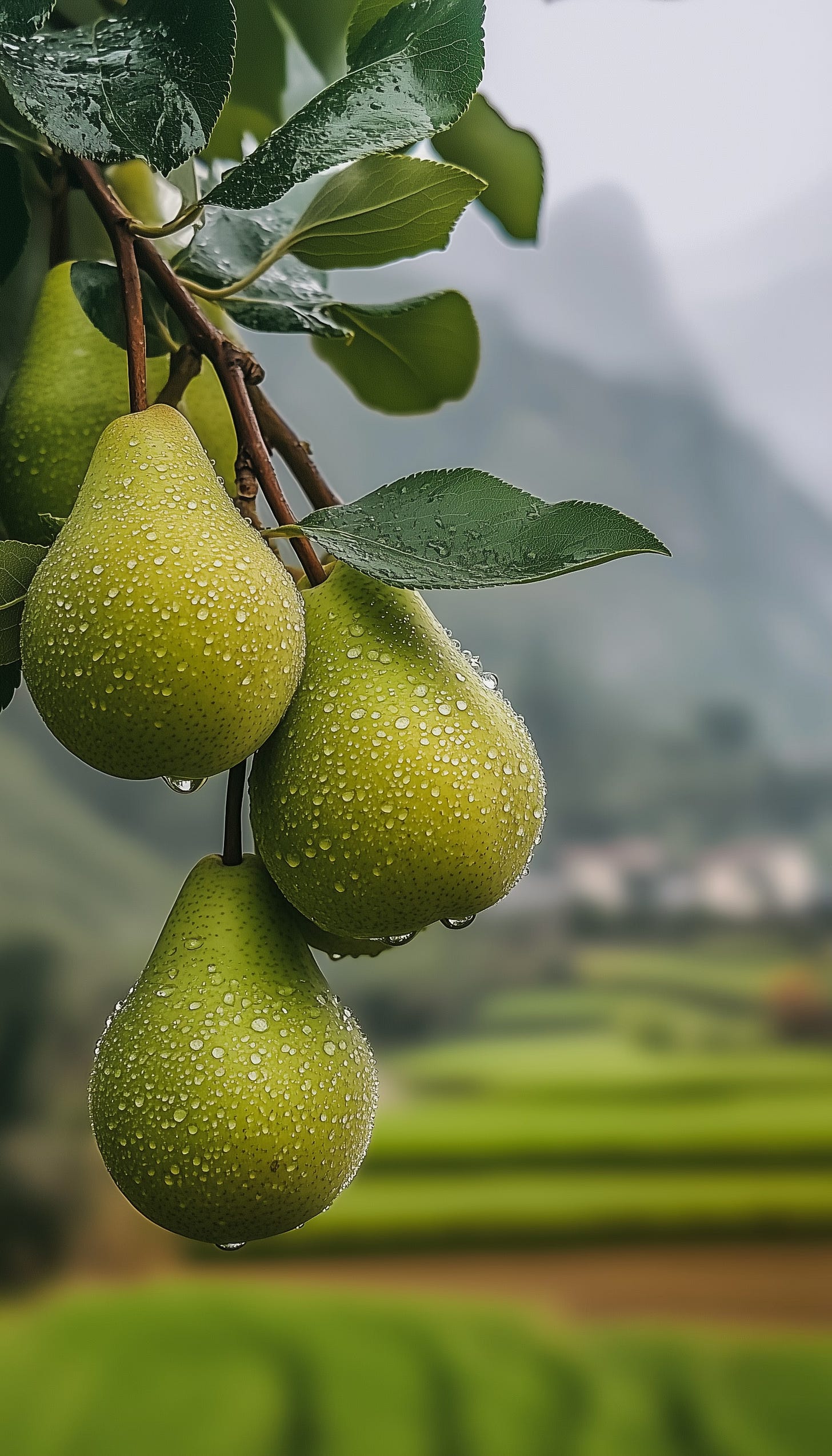As fall begins, pears are at their peak, offering a sweet, juicy treat that's as nutritious as it is delicious. This seasonal fruit, harvested from late summer through early winter, brings a wealth of health benefits, cultural significance, and even some interesting folklore to explore. Let’s dive into the wonders of pears and why they’re a perfect addition to your fall diet.
Health Benefits of Pears
Rich in Dietary Fiber
Pears are an excellent source of soluble and insoluble fiber, which helps support healthy digestion. One medium pear contains about 6 grams of fiber, contributing to gut health, lowering cholesterol levels, and aiding in weight management by promoting fullness.Packed with Antioxidants
Pears contain powerful antioxidants such as vitamin C and phytonutrients like flavonoids. These compounds help neutralize free radicals, protecting cells from oxidative stress and reducing the risk of chronic diseases such as heart disease and cancer.Heart Health Support
Due to their potassium content, pears help regulate blood pressure, while the fiber helps lower LDL cholesterol. Together, these factors make pears a heart-healthy choice, reducing the risk of heart disease and strokes.Hypoallergenic Properties
Pears are often recommended for people with food allergies or sensitivities because they are less likely to cause allergic reactions. This makes them an ideal fruit for introducing babies to solid foods and for those with dietary restrictions.Blood Sugar Regulation
Despite their natural sweetness, pears have a low glycemic index, meaning they cause only a modest rise in blood sugar. This makes them a great snack for people with diabetes or those looking to prevent blood sugar spikes.
Historical, Cultural, and Symbolic Significance
Pears have a rich history dating back thousands of years, with origins in Asia and Europe. They were highly prized in Ancient Greece and Rome, where they were considered a gift from the gods. Greek mythology often linked pears with Hera, the queen of the gods, symbolizing fertility and abundance. In Chinese culture, the pear is a symbol of longevity and prosperity, but there is also a superstition that splitting a pear with someone could lead to separation or bad luck in the relationship.
In the Middle Ages, pears were considered a delicacy for the wealthy, with European nobility cultivating pear trees in their gardens. Over time, they spread throughout the world, becoming a beloved fruit in many countries.
Pear Conspiracy Theories
While not as widely discussed as some other foods, pears have a quirky place in modern conspiracy culture. One theory claims that pears are purposefully bred to be tasteless by large corporations. This stems from complaints that certain commercial pear varieties lack the flavor they had in the past, blaming modern agricultural practices for creating bland-tasting fruit. Another minor conspiracy suggests that pears, with their subtle symbolism of fertility and prosperity, are secretly promoted by luxury brands as an elite fruit to keep their "high society" image alive.
Though these theories are light-hearted and speculative, they show how even the most innocent fruit can spark curiosity and conversation.
Recipe: Translucent Candy Pears with Edible Flowers
Ingredients:
2 ripe pears, thinly sliced
1 cup sugar
½ cup water
Edible flowers (such as pansies or violets)
Lemon juice (for soaking the pears)
Instructions:
Slice the pears thinly and soak them in a bowl of lemon juice for about 10 minutes to prevent browning.
In a saucepan, combine the sugar and water. Bring it to a simmer and cook until the sugar is completely dissolved and forms a simple syrup.
Remove the pears from the lemon juice and pat them dry.
Dip the pear slices into the simple syrup until well coated, then lay them flat on a lined baking sheet.
Press edible flowers onto the pear slices for decoration.
Place the pears in the oven on the lowest setting (around 200°F) for about 1-2 hours, or until they are translucent and slightly crisp.
Let the candied pears cool completely before serving.
These translucent candy pears make a stunning and tasty treat, perfect for fall gatherings or as a unique dessert!
Conclusion
Pears are not only a delicious seasonal fruit but also a symbol of abundance, health, and cultural richness. From their ancient origins to modern health benefits, pears continue to be a beloved and nutritious food that can be enjoyed in a variety of ways. Whether eaten fresh, baked into a pie, or turned into beautiful candy pears adorned with edible flowers, this versatile fruit deserves a place on your fall table.








